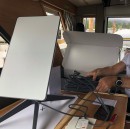SpaceX scored another win against Dish Network in a dispute over the use of the 12-GHz radio spectrum. Dish wanted to use the 12-GHz spectrum for its ground-based 5G network, risking interference with SpaceX satellites operating in the same band. The FCC ruled that the 12.2-12.7 GHz frequency should be reserved for current and future satellite services.
Since SpaceX launched its successful Starlink service, it was a thorn in the back of Dish Network. The satellite television and mobile operator has tried to block Starlink's satellite internet service expansion. Dish petitioned the FCC last year to stop SpaceX from providing satellite internet services to moving vehicles. Eventually, the FCC granted SpaceX a license to provide services to customers in moving vehicles, dealing a blow to Dish's efforts to undermine Starlink's success.
Still, the spat between the two companies dates is old, with the most important battle waged over using the 12-GHz spectrum. SpaceX uses this band to transmit signals from the Starlink satellites to users' terminals. Dish wanted to operate its ground-based 5G network using the same frequency, which SpaceX argued would cause interferences and affect users' experience.
The quarrel reached emotional levels last year when Elon Musk asked Starlink customers to petition FCC to block Dish from using the spectrum. SpaceX said that granting the frequency to Dish could result in total Starlink outages, rendering the service useless for many subscribers. The FCC has agreed with SpaceX on this matter and decided to block Dish.
The FCC unanimously voted to preserve spectrum between 12.2-12.7 GHz for current and future satellite services. The US regulator found the interference risks with Starlink signals to be real. At the same time, the FCC staff indicated that Dish Network failed to make a strong case that its proposed 5G network could co-exist with Starlink. Elon Musk's company thanked its customers for their support, with more than 100,000 people joining the cause and petitioning the FCC.
The conclusion was that even if Dish would use advanced techniques to mitigate interference, it would not solve the main problem. "A new ubiquitous 5G terrestrial service poses a significant risk of harmful interference to DBS (direct broadcast satellite)," the commission staff wrote in the report linked below. Ground-based cellular services must make significant technical improvements to prevent interference risks.
Still, the FCC is not shutting down Dish completely. The vote allows the commission to explore using the 12-GHz spectrum for ground-based networks, but only after following additional studies and comments from the public. The FCC will investigate using the 12.7-13.25 GHz band for cellular uses, which SpaceX doesn't oppose.
There's a silver lining to this spat between Dish Network and SpaceX. In the future, companies must supply clear and detailed technical operational information to support their proposal for using the spectrum for ground-based cellular services. This includes real-world impact studies to prove the service doesn't impact incumbent services.
Still, the spat between the two companies dates is old, with the most important battle waged over using the 12-GHz spectrum. SpaceX uses this band to transmit signals from the Starlink satellites to users' terminals. Dish wanted to operate its ground-based 5G network using the same frequency, which SpaceX argued would cause interferences and affect users' experience.
The quarrel reached emotional levels last year when Elon Musk asked Starlink customers to petition FCC to block Dish from using the spectrum. SpaceX said that granting the frequency to Dish could result in total Starlink outages, rendering the service useless for many subscribers. The FCC has agreed with SpaceX on this matter and decided to block Dish.
The FCC unanimously voted to preserve spectrum between 12.2-12.7 GHz for current and future satellite services. The US regulator found the interference risks with Starlink signals to be real. At the same time, the FCC staff indicated that Dish Network failed to make a strong case that its proposed 5G network could co-exist with Starlink. Elon Musk's company thanked its customers for their support, with more than 100,000 people joining the cause and petitioning the FCC.
The conclusion was that even if Dish would use advanced techniques to mitigate interference, it would not solve the main problem. "A new ubiquitous 5G terrestrial service poses a significant risk of harmful interference to DBS (direct broadcast satellite)," the commission staff wrote in the report linked below. Ground-based cellular services must make significant technical improvements to prevent interference risks.
Still, the FCC is not shutting down Dish completely. The vote allows the commission to explore using the 12-GHz spectrum for ground-based networks, but only after following additional studies and comments from the public. The FCC will investigate using the 12.7-13.25 GHz band for cellular uses, which SpaceX doesn't oppose.
There's a silver lining to this spat between Dish Network and SpaceX. In the future, companies must supply clear and detailed technical operational information to support their proposal for using the spectrum for ground-based cellular services. This includes real-world impact studies to prove the service doesn't impact incumbent services.
Thank you to the 100K+ Starlink customers who spoke up, the @FCC voted to protect high-speed satellite internet users from harmful interference??????????? https://t.co/dwCh3yasNh
— Starlink (@Starlink) May 18, 2023






